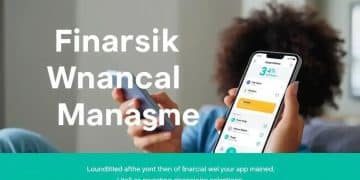What’s new in budgeting app comparisons that matter
Future trends in budgeting applications include increased AI integration for personalized advice, enhanced user experiences through gamification, and greater community engagement for collaborative financial management.
What’s new in budgeting app comparisons can transform the way you manage your finances. Curious about which features make a difference? Let’s dive into the latest updates and insights on budgeting apps.
Key features to look for in budgeting apps
When selecting a budgeting app, it’s essential to understand the key features that can enhance your financial management. The right app not only tracks expenses but also offers valuable insights into your spending habits. Let’s explore some crucial aspects to consider.
User-friendly interface
A straightforward, intuitive interface allows for a smooth user experience. You want an app that makes it easy to enter data and review your finances without frustration. A clear layout often leads to better engagement with your budgeting.
Customization options
The ability to customize categories and budgets is vital. Everyone has unique financial situations, and an effective budgeting app should allow you to adjust categories according to your spending patterns. This flexibility helps in tracking your finances more accurately.
- Expense categories: Create personalized categories for better tracking.
- Budget settings: Set goals tailored to your specific financial needs.
- Alerts: Customize notifications to stay updated on your spending limits.
Another significant feature is the ability to sync your bank accounts. This automatic syncing means you can continuously track your spending without manual entry. It saves time and reduces errors, ensuring your budget remains accurate.
Reporting and analytics
Look for apps that provide insightful reports and analytics. These can help you visualize your spending over time and identify trends. A good budgeting app often displays your data in graphs or charts, making it easier to understand where your money is going.
Similarly, seamless mobile access is critical. Many users prefer managing finances on the go, and a mobile-friendly app ensures you can track your budget anytime, anywhere. When considering budgeting apps, think about how easily you can access your financial information on your smartphone or tablet.
- Multi-device support: Ensure it’s compatible with both smartphones and tablets.
- Offline access: Check if the app provides functionality without internet.
- Security features: Research the app’s security measures to protect your data.
Ultimately, choosing the right budgeting app revolves around identifying features that enhance your financial planning. Whether you want better analytics or increased customization, understanding these key features will help you find the right fit for your lifestyle.
Comparing popular budgeting apps: a detailed view

When comparing popular budgeting apps, it’s crucial to evaluate their distinct features and how they cater to different financial needs. Understanding what each app offers can help you make an informed choice.
App A: Features and Benefits
App A is known for its user-friendly interface, which makes it easy for beginners. With real-time expense tracking, users can see their financial situation at a glance. Additionally, it offers advanced reporting features that help in analyzing spending habits.
- Real-time updates: Keep your budget current without manual entries.
- Customizable categories: Tailor your budget according to your life.
- Engaging reports: Visualize your spending trends with graphs.
This app is ideal for those who prefer a straightforward approach without overwhelming complexity.
App B: A Different Focus
On the other hand, App B targets users looking for comprehensive financial planning tools. It not only tracks expenses but also offers features for savings goals and investment tracking. This makes it suitable for users wanting to take control of their complete financial picture.
- Savings goals: Set and monitor your progress toward financial targets.
- Investment tracking: Manage and assess your investments.
- Collaborative features: Share budget plans with family or partners.
With its robust set of tools, App B is excellent for users who want to dive deeper into their finances.
When comparing these apps, consider whether you desire simplicity or a more detailed overview of your financial health. Each app serves a different purpose, and knowing which features matter most to you can significantly impact your budgeting experience.
App C: Unique Selling Points
Another contender, App C, stands out for its budgeting advice and financial tips provided within the app. For those who appreciate a guided approach, this feature could be extremely beneficial. The tips often come based on your spending patterns, helping you make smarter financial decisions.
- Budgeting advice: Receive tailored suggestions to improve your savings.
- Community support: Engage with other users for shared advice.
- Gamification: Enjoy a fun approach to managing budgets.
This app is perfect for users who need a bit of motivation and guidance along their budgeting journey.
How user reviews shape budgeting app rankings
User reviews play a significant role in how budgeting apps are ranked in the market. For many potential users, reviews provide insights into the real experiences of others. This transparency can heavily influence decisions on which app to download.
The Impact of User Feedback
Positive reviews often highlight features that users find beneficial, such as ease of use and effectiveness in managing expenses. Users typically mention aspects they love, fostering trust in the app. Conversely, negative reviews can raise red flags, making users cautious. When many reviews point out similar issues, it can change the perception of an app quickly.
- User satisfaction: Higher ratings reflect better user satisfaction, encouraging new downloads.
- Feature requests: Users often suggest improvements or features they wish to see, influencing updates.
- Trustworthiness: Apps with numerous glowing reviews are often deemed more trustworthy.
As users read through these reviews, they look for patterns that resonate with their budgeting needs. The more consistent positive feedback an app has, the higher it ranks on various download platforms.
How Platforms Use Reviews
Many app stores take user ratings into account when determining app rankings. They often give priority to apps with higher ratings, placing them at the top of search results. This visibility is crucial for app developers. When an app regularly receives positive feedback, it not only boosts its rankings but also enhances its reputation.
Developers pay attention to user reviews as a means of improvement. Feedback from users can lead to updates that add features or improve performance. By actively responding to criticism or suggestions, app developers show they value user opinions, which can further enhance their app’s reputation.
Community Engagement
The community aspect of user reviews shouldn’t be overlooked. Many users share their personal stories about using budgeting apps, creating a sense of community. This sharing fosters engagement and encourages others to try the app based on relatable experiences.
- Peer influence: Reviews can influence friends and family recommendations.
- Community support: Users feel they are part of a bigger conversation about finances.
- Shared tips: Users often share budgeting tips in their reviews.
Ultimately, user reviews shape the landscape of budgeting apps significantly. They serve as both a guide for potential users and a tool for developers to refine their products.
Future trends in budgeting applications

As technology continues to evolve, the future trends in budgeting applications promise to enhance the way users manage their finances. Emerging technologies and changing consumer expectations are key drivers of these trends.
Increased Integration with AI
One of the most significant trends is the integration of artificial intelligence (AI) in budgeting apps. AI can analyze spending patterns, predict future expenses, and even offer personalized financial advice. This functionality allows users to have a more tailored budgeting experience.
- Predictive analytics: Apps will forecast expenses based on historical data.
- Personalized tips: Receive advice tailored to user spending habits.
- Automated savings: AI can suggest how much to save based on upcoming expenses.
By leveraging AI, budgeting apps will empower users to make smarter financial decisions with less effort.
Enhanced User Experience
Future budgeting apps will also focus on enhancing the user experience. This includes improved interfaces that are both intuitive and engaging. Users expect apps that are not only functional but also enjoyable to use. A seamless design can encourage users to engage more frequently with their finances.
Features like gamification are likely to become more common. Users might earn rewards for hitting budgeting goals or completing financial tasks, making budgeting feel less like a chore.
- Interactive dashboards: Users will have access to visually appealing charts and graphs.
- Goal-setting features: Set and track financial goals easily.
- Notifications: Reminders for bills and budget limits will help keep users informed.
This gamified and user-centered approach can lead to better financial habits.
Focus on Collaboration and Community
Another emerging trend is the emphasis on collaboration and community within budgeting apps. Many users seek ways to share their financial journeys with friends or family. Future apps may offer features that allow users to collaborate on budgets, share tips, or even compete on spending challenges, creating a sense of community.
This social aspect can help foster accountability, as users share their goals and achievements with others. Personal finance forums or in-app messaging may provide spaces for users to connect.
- Shared budgets: Collaborate with family or friends on saving goals.
- Community challenges: Participate in challenges to encourage savings.
- Social aspects: Engage with others for motivation and support.
Overall, the future of budgeting applications is bright, focusing on advanced technology, user engagement, and community connections.
In summary, the future trends in budgeting applications are set to revolutionize how we manage our finances. With increased integration of artificial intelligence, enhanced user experiences, and a focus on community engagement, budgeting apps will become more accessible and enjoyable. These developments not only help users track their spending but also encourage healthier financial habits. As these technologies evolve, users can expect to gain improved insights and access tools that make budgeting a breeze. Embracing these trends will empower individuals to take greater control of their financial lives.
FAQ – Common Questions about Budgeting Applications
What are the key features to look for in budgeting apps?
Look for features like AI integration, user-friendly interfaces, customizable categories, and real-time tracking to enhance your budgeting experience.
How do user reviews influence budgeting app choices?
User reviews provide valuable insights into the effectiveness and reliability of an app, helping potential users make informed decisions.
What role does community engagement play in budgeting apps?
Community engagement allows users to share tips, collaborate on budgets, and foster accountability, which can enhance motivation and financial management.
Are budgeting apps secure for managing personal finances?
Yes, most budgeting apps implement strong security measures, including encryption and data protection protocols, to ensure user information remains safe.





